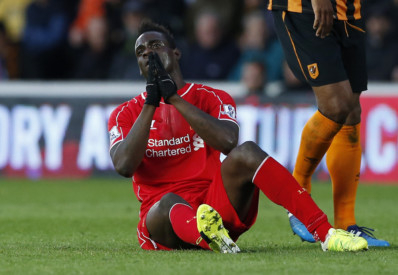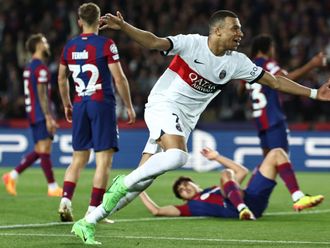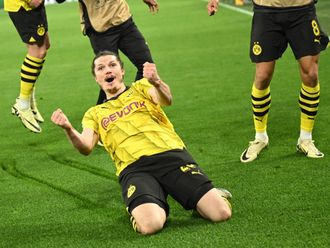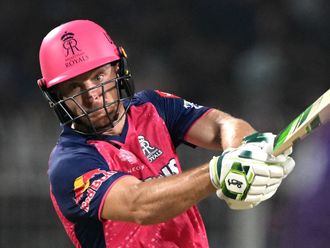
It is time for Mario Balotelli to change the message. Why not me any more? The intense moments that seemed to follow him around appear to be toned down these days, because he spends too much time on the periphery.
Balotelli, this singular character, this impetuous talent who can tie his coaches in knots because they know what qualities lurk beneath all the complexity, if only they could coax them to shine, is at yet another career crossroads.
But the trouble is, these junctures are markers forming a pattern of gradual decline. Balotelli’s moments are not as charasmatic. They are less frequent. It isn’t him anywhere near often enough and that’s a pity.
With Liverpool the third club in as many years to reach a shrugging acceptance that it isn’t working out (following Manchester City in 2013 and AC Milan in 2014) it’s hard to envisage where or how Balotelli might fulfil a bit more of the bristling potential that captured the imagination when he burst onto the scene.
Here was a teenager with a powerful mix of maverick talent and idiosyncratic personality. The challenge to harness it has tempted most of his managers, notably Jose Mourinho at Inter, Roberto Mancini at Man City and Cesare Prandelli with Italy, who were at once intrigued, endeared and driven to distraction by the enigma of Balotelli.
Tellingly, Brendan Rodgers seldom echoed that sentiment. There was always a coolness. A distance. The arrangement seemed doomed from the start, when Rodgers intimated in his welcome message when Balotelli moved to Anfield last summer that it was a “calculated risk” and not really according to his plan.
Balotelli turns 25 next month. His breakthrough season came at the age of 17. On the assumption that he is lucky enough with injuries to play until his early 30s, he is roughly halfway though his career.
With his range of experience at important clubs and in the Italian national team, he should be approaching his peak years round about now. Instead he is contemplating how to revive a scenario that leaves him out of the main picture for his current club and his country.
With Liverpool purchasing attacking players with intent, an exit strategy makes sense. But there may not be a queue of suitors willing take the gamble. Loose cannon plus poor form, multiplied by heavyweight salary, doesn’t make a particularly attractive equation.
It was sobering to see the reaction of some Fiorentina tifosi when rumours of a transfer surfaced recently. There is some history between player and club from when he was the target of racist taunting in 2013, and a banner opposing his arrival this summer was pinned to the training ground. It read “You are a man without honour. Balotelli Florence doesn’t want you.”
The uncomfortable undercurrent in Italy’s relationship with Balotelli is one of the reasons he supposedly found it easier to be in England. But the move back to the Premier League a year ago has not easily given him the freedom to express himself, which leads to more doubt about the direction of this once promising career.
Former Italy manager Prandelli, who was always one of Balotelli’s staunchest supporters, wanted the striker he described as a very sensitive person to become a “reference point” for the Azzurri. Even putting to one side the sporting reasons, for all sorts of social and human reasons, that would be a wonderful thing.
The son of Ghanaian immigrants, adopted by Holocaust survivors Francesco and Silvia in Brescia, his upbringing was uncommon in conservative northern Italy. The racism, the barriers, the love of his adoptive parents, the many questions he must have asked himself are all part of what makes him the person he is.
He is an unusual poster boy for Italian football, which is why it would be poignant for Balotelli to swing his career around, and to find the focus for his undeniable ability to flourish.
He is capable of great things. His pair of goals to defeat Germany in the semi-final of Euro 2012 — one a predatory header, the other a rising thunderbolt — demonstrate that superbly.
The current Italy manager, Antonio Conte, has marginalised Balotelli from the national team. Dropped after Italy’s demoralising World Cup last summer, he has not had much of an opportunity to re-stake his claim. Last Autumn, Conte suggested he didn’t have the time to try to unlock the Balo conundrum. “I’m not so arrogant as to claim I’m different from the great coaches, but the past tells us they failed to change Balotelli. It will be up to the player, but I don’t have much time.”
Balotelli has a season ahead that feels profoundly defining. He needs — somewhere, somehow — to find a rhythm at club level. He has a European Championship to aspire to force his way into next summer in France.
The Liverpool experiment looks like a case of going to the wrong team at the wrong time. In fairness, Balotelli had company last season in the corner reserved for strikers Rodgers didn’t seem to trust. Rickie Lambert and Fabio Borini were there too.
But Balotelli being Balotelli, the big character who carried a little more world superstar baggage than the other fringe forwards, there was always more of an issue there. Of course he didn’t score enough goals, and generally didn’t appear settled and secure. He showed flashes, but not enough to suggest he would flourish at Anfield.
So what now? According to Rodgers, the future “will be entirely up to Mario”. One more chance, perhaps, to grab it with both hands.
— Guardian News & Media Ltd, 2015










